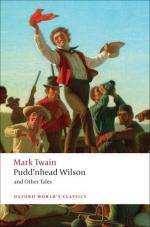At other sittings of the parliament, gentlemen of the Opposition, shaking their fists toward the President, addressed him as ‘Polish Dog’. At one sitting an angry deputy turned upon a colleague and shouted, ‘----------!’
You must try to imagine what it was. If I should offer it even in the original it would probably not get by the editor’s blue pencil; to offer a translation would be to waste my ink, of course. This remark was frankly printed in its entirety by one of the Vienna dailies, but the others disguised the toughest half of it with stars.
If the reader will go back over this chapter and gather its array of extraordinary epithets into a bunch and examine them, he will marvel at two things: how this convention of gentlemen could consent to use such gross terms; and why the users were allowed to get out the place alive. There is no way to understand this strange situation. If every man in the House were a professional blackguard, and had his home in a sailor boarding-house, one could still not understand it; for, although that sort do use such terms, they never take them. These men are not professional blackguards; they are mainly gentlemen, and educated; yet they use the terms, and take them too. They really seem to attach no consequence to them. One cannot say that they act like schoolboys; for that is only almost true, not entirely. Schoolboys blackguard each other fiercely, and by the hour, and one would think that nothing would ever come of it but noise; but that would be a mistake. Up to a certain limit the result would be noise only, but, that limit overstepped, trouble would follow right away. There are certain phrases—phrases of a peculiar character—phrases of the nature of that reference to Schonerer’s grandmother, for instance—which not even the most spiritless schoolboy in the English-speaking world would allow to pass unavenged. One difference between schoolboys and the law-makers of the Reichsrath seems to be that the law-makers have no limit, no danger-line. Apparently they may call each other what they please, and go home unmutilated.
Now, in fact, they did have a scuffle on two occasions, but it was not on account of names called. There has been no scuffle where that was the cause.
It is not to be inferred that the House lacks a sense of honour because it lacks delicacy. That would be an error. Iro was caught in a lie, and it profoundly disgraced him. The House cut him, turned its back upon him. He resigned his seat; otherwise he would have been expelled. But it was lenient with Gregorig, who had called Iro a cowardly blatherskite in debate. It merely went through the form of mildly censuring him. That did not trouble Gregorig.




